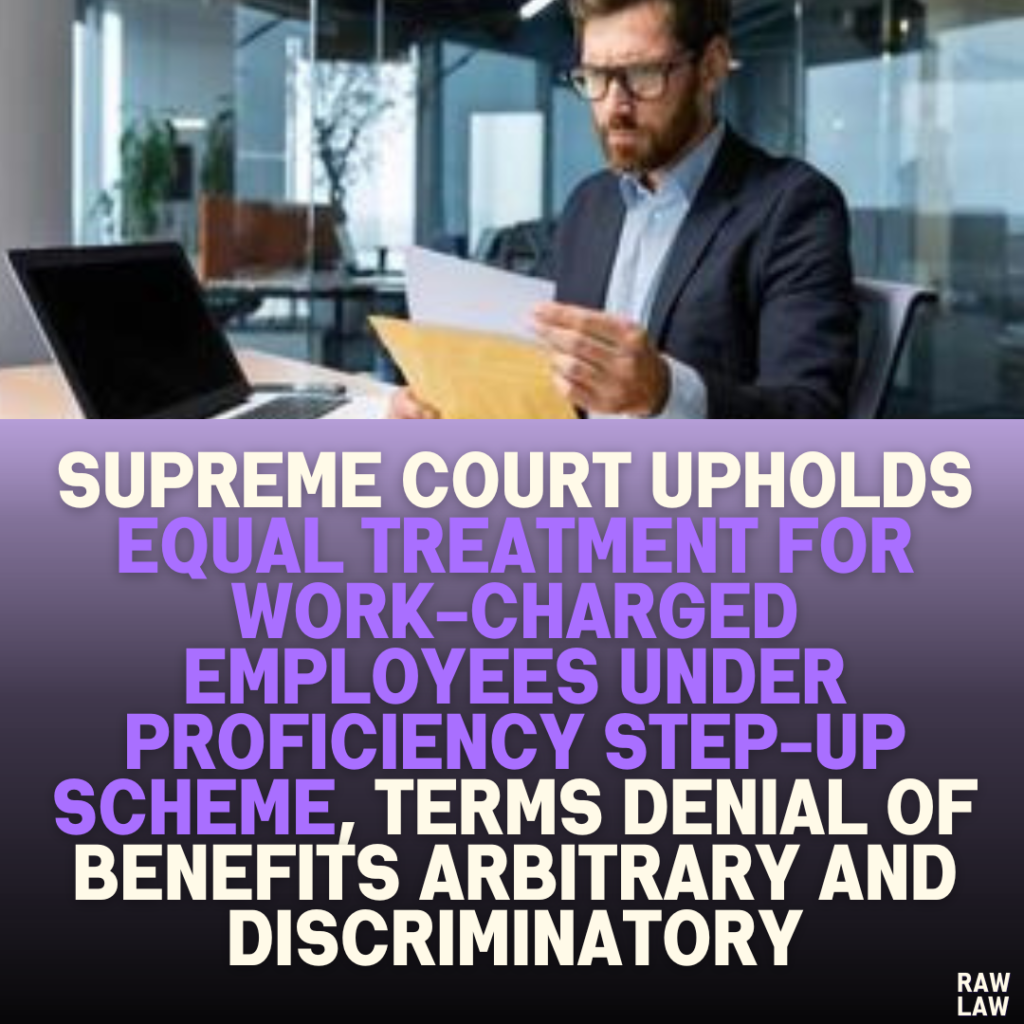Court’s Decision
The Supreme Court reversed the decisions of the learned Single Judge and Division Bench of the Punjab and Haryana High Court. It directed that appellants are entitled to have their service in the work-charged establishment counted as qualifying service for benefits under the Proficiency Step-Up Scheme, 1988. The monetary benefits resulting from this decision must be paid to the appellants within six months.
Facts
The appellants were employees of the State of Punjab, initially employed in the work-charged establishment. Over time, their services were regularized, and they sought benefits under the Proficiency Step-Up Scheme, 1988. This scheme aimed to provide financial incentives to employees based on their length of service, such as 8 and 18-year increments.
The appellants argued that their work-charged service period before regularization should count toward qualifying service for these benefits. However, their claims were denied by the High Court, which treated the scheme at par with the Assured Career Progression Scheme, 1998. The High Court concluded that the appellants were not entitled to these benefits, leading to the appeal before the Supreme Court.
Issues
- Primary Issue: Should the work-charged service rendered by the appellants before regularization be counted for benefits under the Proficiency Step-Up Scheme, 1988?
- Does the denial of benefits to the appellants amount to discrimination against similarly situated employees who received such benefits?
Petitioner’s Arguments
- The appellants argued that the Government of Punjab, through its circular dated 13th March 1996, explicitly provided that the services of work-charged employees would be regularized and their past service would count as qualifying service for pensionary and other benefits.
- It was contended that the denial of benefits was discriminatory since other similarly situated employees had received these benefits.
- They cited the policy and circulars issued by the government, including specific provisions stating that work-charged service qualifies for benefits.
Respondent’s Arguments
- The State of Punjab argued that benefits under the Proficiency Step-Up Scheme were extended only to employees where there were specific court orders in judicial proceedings.
- They maintained that appellants could not claim these benefits in the absence of such orders. However, the State could not dispute the existence of government circulars granting these benefits to similarly placed employees.
Analysis of the Law
- Government Circulars: The circular dated 13th March 1996 clearly stated that the service of work-charged employees would be treated as qualifying service for pensionary and other consequential benefits. The circular of 12th April 2005 directed officials to assess the number of employees entitled to the benefits and the financial implications.
- Judicial Orders: Earlier judicial decisions, including rulings of the Industrial Tribunal, had established the entitlement of work-charged employees to similar benefits.
- Proficiency Step-Up vs. ACPS: The Proficiency Step-Up Scheme, 1988, was distinct from the Assured Career Progression Scheme, 1998. The High Court had erroneously treated them as equivalent, leading to the denial of relief to the appellants.
Precedent Analysis
- Punjab State Electricity Board v. Jagjiwan Ram (2009) 3 SCC 661: This judgment was relied upon by the High Court to deny relief but was distinguished by the Supreme Court in this case.
- Industrial Tribunal Orders: The Tribunal had previously ruled that work-charged service must count for career benefits. This decision was upheld by the Punjab and Haryana High Court and later affirmed by the Supreme Court in prior cases.
Court’s Reasoning
- The Court emphasized that the High Court overlooked the clear provisions of the Proficiency Step-Up Scheme and conflated it with the ACPS.
- It found that denying benefits to the appellants, while granting them to other similarly situated employees, was arbitrary and discriminatory, violating the principle of equality under Article 14 of the Constitution.
- The policy circulars and earlier judicial decisions unequivocally established that work-charged service qualified for Proficiency Step-Up benefits.
Conclusion
The Supreme Court directed that:
- The appellants’ work-charged service be counted as qualifying service under the Proficiency Step-Up Scheme, 1988.
- All monetary benefits be calculated and disbursed within six months.
- The earlier High Court judgments were reversed, and no costs were awarded.
Implications
- Equality for Work-Charged Employees: This decision reaffirms the principle that similarly situated employees must be treated equally, strengthening protections under Article 14 of the Constitution.
- Clarification of Policy Interpretation: It clarifies the distinct nature of the Proficiency Step-Up Scheme and sets a precedent for interpreting service regularization policies.
- Impact on Governance: The judgment mandates careful adherence to circulars and policies in providing service benefits, reducing arbitrary denials by administrative authorities.



